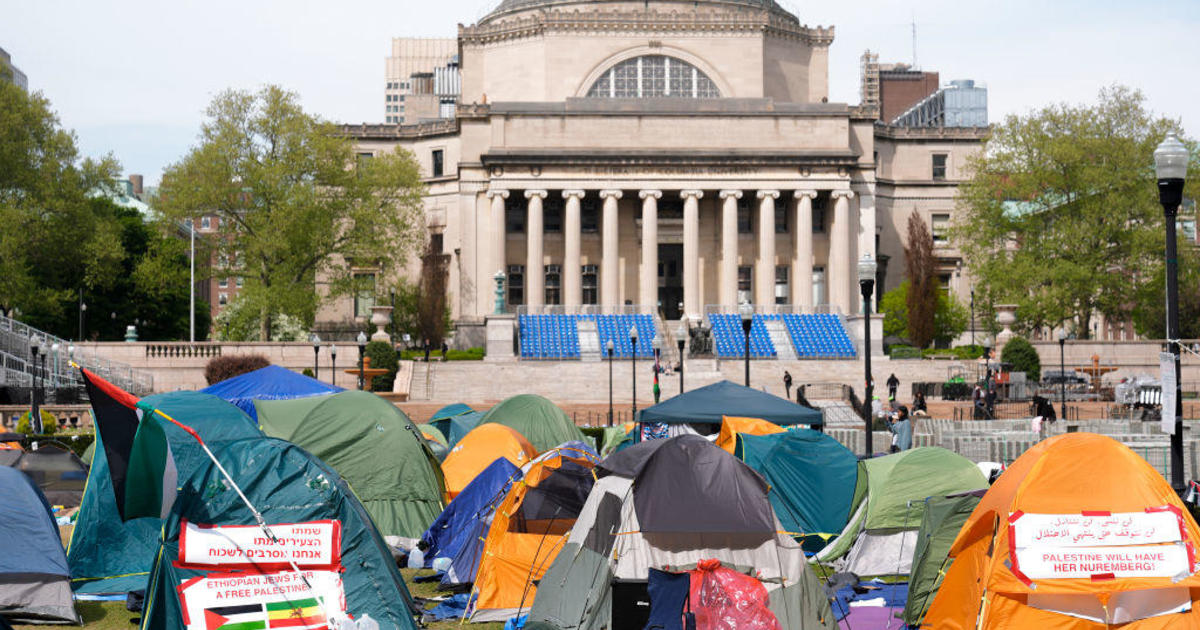CBS News
What is Sidechat? The controversial app students have used amid campus protests, explained

When Los Angeles Police Department officers in riot gear arrived at the University of California, Los Angeles early Thursday, the anonymous messaging app Sidechat filled with posts trying to piece together what was happening: “Is everyone ok? I just heard like 8 cop cars go by,” one post read. Others shared rumors about police action and outside agitators and pointed students to live streams to watch the events unfold.
Sidechat has taken on a new role on college campuses as pro-Palestinian demonstrations and law enforcement’s response to them have escalated in recent weeks. Posts on the app are anonymous, allowing students to share opinions and updates freely in a way they often can’t on other platforms. But Sidechat’s anonymous nature has also fueled hateful rhetoric, college administrators say, raising questions about its role in spreading division on campuses.
What is Sidechat?
The app launched in 2022 and was marketed to college students as a digital space to talk authentically about campus life. Students log in with their university email addresses to access closed groups that are specific to each school — similar to Facebook when it first began as a platform only for students with “.edu” addresses.
But 20 years after Facebook launched, students today are navigating a much more complex digital landscape fraught with concerns about online privacy. Just as protesters wear masks and scarves to hide their identities at the protests, anonymous apps like Sidechat offer protection to posters who share opinions on divisive topics without having their name or even a username attached to their posts.
Sidechat resembles a previously popular anonymous app called Yik Yak, which launched in 2013 and allowed users to see posts from people within a 5-mile radius. The app was banned from at least half a dozen campuses after concerns about bullying and harassment on the platform. Sidechat acquired Yik Yak in 2023. Fizz, another anonymous app founded a year before Sidechat, has also gained popularity on college campuses.
Fear, frustration and tension as protests mount
CBS News reviewed Sidechat conversations at five schools where pro-Palestian protests have taken place: Columbia, Harvard, the University of Texas at Austin, UCLA and New York University. While some posts called on students to join the protests, others criticized them for disrupting campus life.
However, criticism of police presence and university response united many students. At Columbia, students expressed anger and dismay at the university’s decision to call in the NYPD on Tuesday to dismantle the encampment and clear Hamilton Hall, where some protesters had barricaded themselves. A video of a protester tumbling down steps in front of Hamilton Hall was upvoted more than 1,600 times as posters alleged police used excessive force.
Posts in some university Sidechat groups said students were struggling to concentrate on exams during the protests. A post on the UT Austin chat read, “This is all very distracting for people and I think everyone deserves a curve on their finals.”
CBS News
CBS News
Allegations of hate on the platform
The anonymous nature of Sidechat has allowed for harassment and bullying, college administrators and lawmakers have said. The app came under scrutiny by the House Committee on Education and the Workforce in its ongoing investigations into how Columbia, Harvard and other universities have handled alleged incidents of antisemitism.
In an April 17 hearing with the committee, Columbia President Minouche Shafik said Sidechat was “poisonous” and that “probably the most egregious cases that we’ve seen of antisemitism, Islamophobia, racist comments have been on social media on those anonymous channels.”
In February, a 114-page legal complaint filed on behalf of Jewish students at Columbia alleged that Sidechat was used to harass one Jewish student who had removed a political flier from a dorm hallway. Users on Sidechat shared her dorm room location and encouraged students to vandalize her space, the filing says.
In January, Harvard asked Sidechat to do more to monitor “concerning content” on its school group. According to Inside Higher Education, Sidechat assured the school it would moderate posts to ensure community guidelines aren’t violated.
CBS News found multiple posts across university chats that used aggressive or obscene language to describe protesters on both sides of the issue.
This week, posts and comments on Harvard’s chat denied or made light of the notion that Jewish students might feel unsafe on campus. In a UCLA Sidechat group conversation, a student wrote that protesters were “indoctrinated sheep,” while another posted that they “wish nothing but the worst for the people in the encampment.” Posters in UT Austin’s forum leveled similar insults at people taking part in protests.
The University of North Carolina at Chapel Hill, which has also seen protests related to the Israel-Hamas war, has blocked access to Sidechat and similar anonymous messaging apps outright on its campus Wi-Fi after the president said in February that the apps have “shown a reckless disregard for the wellbeing of young people and an outright indifference to bullying.”
Sidechat cofounder Sebastian Gil did not respond to a request for an interview. Gil told USA TODAY in March that Sidechat has a team of 30 content moderators who review and remove posts that violate its terms of use against content that is threatening, offensive or profane. The app also warns users that posts containing students’ names will be deleted.
Jui Sarwate contributed to this report.
CBS News
One year after Oct. 7 attack, the toll on civilians remains high

Watch CBS News
Be the first to know
Get browser notifications for breaking news, live events, and exclusive reporting.
CBS News
Open: This is “Face the Nation with Margaret Brennan,” Oct. 6, 2024

Watch CBS News
Be the first to know
Get browser notifications for breaking news, live events, and exclusive reporting.
CBS News
Kamala Harris will speak with “60 Minutes” tomorrow. Here’s what to know for the interview.

Voters will get the chance to hear from Vice President Kamala Harris on Monday as she presents her case for why she should be president in a “60 Minutes” election special.
For decades, “60 Minutes” has featured both Republican and Democratic nominees for presidents, but this year, former President Donald Trump backed out after previously indicating he would be on the show. Correspondent Scott Pelley, who’d been set to interview Trump, will instead travel to Arizona’s Maricopa County, home to more than 60% of Arizona’s voters and a critical battleground in a key swing state.
One thing is certain about the election; with the U.S. deeply involved in both the wars in Ukraine and the Middle East, whoever wins on Nov. 5 will become a wartime president.
What Harris will discuss
Israel’s war started one year ago after Hamas launched a surprise terror attack and correspondent Bill Whitaker will discuss the ongoing war with Harris.
Harris will also discuss the economy, immigration, her record as vice president and the differences between herself and Trump.
Democratic vice presidential candidate Gov. Tim Walz will also appear.
Whitaker joined the Democratic ticket on the campaign trail this week to gain insight into their platform’s priorities and values, and what the candidates believe voters should know.
Why Trump pulled out of the “60 Minutes” interview
Leading up to the candidate hour, Trump, through campaign spokespeople, was the first candidate to accept the “60 Minutes” request to be interviewed for the special, according to CBS News. It had been agreed that both candidates would receive equal time during the broadcast.
Trump last sat down with 60 Minutes in 2020. He walked out during the interview with Lesley Stahl. Trump referenced the incident on Tuesday night at a Milwaukee press conference when asked about his decision not to participate in the Oct. 7 “60 Minutes” election special.
“Well, right now, I went to – they came to me and would like me to do an interview, but first I want to get an apology, because the last time I did an interview with them, if you remember, they challenged me on the computer,” Trump said. “They said the ‘laptop from hell’ was from Russia, and I said it wasn’t from Russia. It was from Hunter, and I never got an apology, so I’m sort of waiting. I’d love to do ’60 Minutes.’ I do everything.”
The Republican nominee for president emphasized that he felt he was owed an apology from “60 Minutes.”
“Let’s see if they do it. I wouldn’t mind doing 60,” Trump continued. “I’ve done ’60 Minutes’ a lot.”
In a statement on Tuesday, Trump campaign communications director Steven Cheung said that Trump’s team had not agreed to an interview.
“Fake News,” Cheung said in a post on X. “60 Minutes begged for an interview, even after they were caught lying about Hunter Biden’s laptop back in 2020. There were initial discussions, but nothing was ever scheduled or locked in. They also insisted on doing live fact checking, which is unprecedented.”
Previous Trump, Harris appearances on 60 Minutes
Trump previously sat down with “60 Minutes'” Mike Wallace in 1985, Pelley in 2015 and Lesley Stahl twice in 2016, first in July of that year and then again in November of 2016. He also spoke with Stahl again in 2018 and 2020.
Harris previously sat down with Whitaker last year. She also was interviewed by Norah O’Donnell, “CBS Evening News” anchor and “60 Minutes” contributing correspondent, in 2020.




